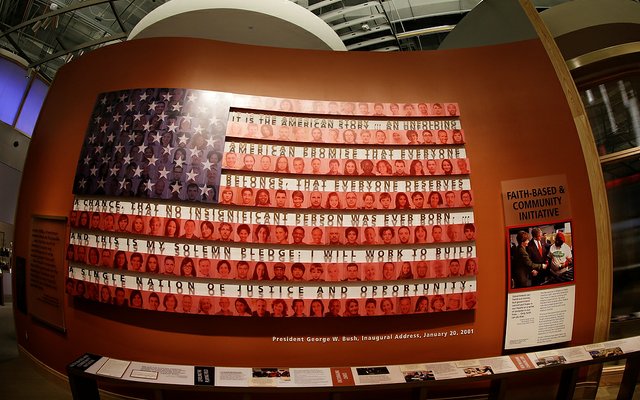 Among the displays unveiled at yesterday’s opening of the George W. Bush Library on the Southern Methodist University campus was one dedicated to the 43rd president’s faith-based and community initiative, as well there should be. Bush came into office with this as his most pressing domestic priority, and it’s always seemed to be the thing he most cared about doing as the nation’s chief executive. If 9/11 hadn’t taken over his presidency in Year One, and the Great Recession hadn’t ushered it out in Year Eight, the initiative could well have become its touchstone.
Among the displays unveiled at yesterday’s opening of the George W. Bush Library on the Southern Methodist University campus was one dedicated to the 43rd president’s faith-based and community initiative, as well there should be. Bush came into office with this as his most pressing domestic priority, and it’s always seemed to be the thing he most cared about doing as the nation’s chief executive. If 9/11 hadn’t taken over his presidency in Year One, and the Great Recession hadn’t ushered it out in Year Eight, the initiative could well have become its touchstone.
As it was, it stands in the category of “lessons learned.” The idea of getting faith-based organizations (FBOs) more engaged in social service provision dated back to welfare reform during the Clinton Administration. It was a centrist idea, equally disliked by strict church-state separationists on the left and pedal-to-the-evangelistic-metal religious rightists. Bush, a guy who believed religion had turned his own life around, really believed that adding religion to the mix of publicly funded social services would turn a lot of other lives around. Committed to making it a bipartisan effort, he appointed UPenn Prof. John DiIulio, the big kahuna of faith-based academics and a Democrat to boot, to head it up.
But DiIulio had his troubles with the White House politicos who saw the new faith-based office as an excellent opportunity to use government grants to undermine the vote-generating machines of black pastors in swing states. “Mayberry Machiavellis,” DiIlulio called them, departing in a whirl of ill-will the month before 9/11. The GOP politics didn’t stop, as the late David Kuo, the office’s second-in-command, later detailed in Tempting Faith, a book about his disillusionment.
Meanwhile, congressional Democrats put a stop to any effort to pass faith-based legislation, objecting in particular to Bush’s insistence that FBOs be allowed to practice faith-based employment discrimination in publicly funded jobs. So the initiative trundled along in the semi-darkness, claiming it was just about leveling the playing field for FBOs to fully participate in the service provision game.
And trundling along it still is, although under its new Obama name the office no longer focuses on the funding piece. Avoiding controversy has been its watchword, with the hiring issue deep-sixed over at the Justice Department’s Office of Legal Counsel. At this point what we can say is that Bush lit a flickering candle that’s now being hid under a bushel. You pretty much have to go to SMU to see it.





